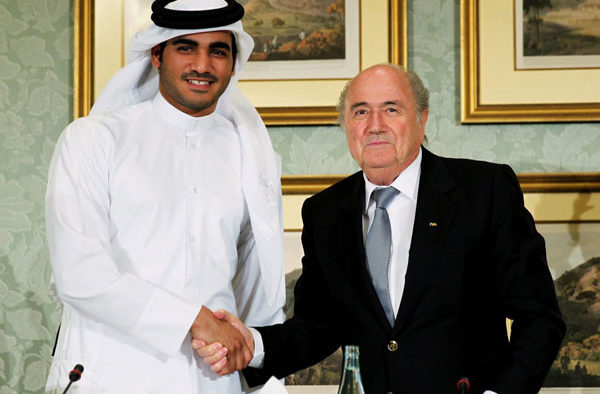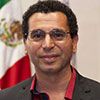On Boycotts and the Beautiful Game

Proposition: The World Cup in Russia and/or Qatar should be boycotted
 Tamir Bar-On is Professor in the Department of International Relations and Humanities, Tecnologico de Monterrey, Campus Queretaro, Mexico (against): It might seem counterintuitive for a political scientist to take a position against boycotting the World Cups in Russia and Qatar in 2018 and 2022, respectively. Let me point out at the outset that I am a critic of both the Russian and Qatari regimes. Both are authoritarian regimes. Russia has recently engaged in expansionist militarism in Ukraine, illegally annexing Crimea. It is eroding the civil liberties of its citizens and journalists. If you are a parliamentarian questioning wars in Chechnya, Georgia or Ukraine, you can be labelled a traitor to the nation.
Tamir Bar-On is Professor in the Department of International Relations and Humanities, Tecnologico de Monterrey, Campus Queretaro, Mexico (against): It might seem counterintuitive for a political scientist to take a position against boycotting the World Cups in Russia and Qatar in 2018 and 2022, respectively. Let me point out at the outset that I am a critic of both the Russian and Qatari regimes. Both are authoritarian regimes. Russia has recently engaged in expansionist militarism in Ukraine, illegally annexing Crimea. It is eroding the civil liberties of its citizens and journalists. If you are a parliamentarian questioning wars in Chechnya, Georgia or Ukraine, you can be labelled a traitor to the nation.
For its part, Qatar is an authoritarian Gulf monarchy. There have been reports of forced labour in various newspapers, as well as reports of deaths of labourers working on the building of World Cup facilities.
Despite being a critic of both of these authoritarian regimes and of the way in which FIFA conducts bids for World Cups (corruption, kickbacks, and bribery have been reported), I believe that boycotts are counterproductive. First, if you boycott a regime like the one in Russia or Qatar, your message will stay home. But if you go to the World Cup, your message can get out to the world in a more powerful manner. You will impact more people. Remember the black power salutes of sprinters Tommie Smith and John Carlos at the 1968 Olympic Games in Mexico City. They were powerful reminders to the entire world that blacks were still second-class citizens in the US. If Smith and Carlos had stayed home, no one would have listened to their message.
Second, boycotts are contrary to the spirit of international sport. International sport should be indifferent to regime type, ideology, nation, culture, religion, linguistic group, tribe or sexual orientation. International sporting competitions should be about the feats of the wonderful athletes from all countries – not about politicians. FIFA has made a mistake by not compelling Arab countries to play Israel in sporting competitions. The de facto boycott of Israeli soccer clubs and national teams by Arab states (and Iran) is contrary to the spirit of international sport. Israeli soccer clubs and national teams now play out of their geographical zone in Europe, thus giving them a disadvantage in qualifying for the World Cup because they must play against superior European rather than Asian opponents.
Finally, the best response to a boycott is winning and shutting up the critics, or sometimes even the racists. When Jesse Owens, a black American athlete, won his four sprinting gold medals at the Berlin Olympics in 1936, he made a mockery of Hitler’s warped ideas in respect of the superiority of the so-called Aryan race. Far more recently, the Ivory Coast international and Manchester City star Yaya Touré said that he would consider boycotting the World Cup in Russia because of the racial abuse that he has endured from Russian fans. My message to Touré is to not let the racists win. Do not silence your powerful anti-racist message. Go to Russia, speak out against racism there, and win the World Cup for Ivory Coast!
 Daniel Friedrich is a philosopher and a consultant on sustainable food consumption based in Berlin (for): Given the powerful competition at the World Cup, the prospect of Ivory Coast, led by a brilliant Yaya Touré, lifting the trophy at the Luzhniki Stadium in Moscow seems highly improbable. It is, however, vastly more probable than any racist being shut up, as it were, by this result. Racists have long ago come to accept the reality of black star athletes. One more spectacular sporting success is not going to shake their warped emotional house.
Daniel Friedrich is a philosopher and a consultant on sustainable food consumption based in Berlin (for): Given the powerful competition at the World Cup, the prospect of Ivory Coast, led by a brilliant Yaya Touré, lifting the trophy at the Luzhniki Stadium in Moscow seems highly improbable. It is, however, vastly more probable than any racist being shut up, as it were, by this result. Racists have long ago come to accept the reality of black star athletes. One more spectacular sporting success is not going to shake their warped emotional house.
Ivory Coast winning the World Cup is also not going to send a message about human rights abuses, about political and press freedoms being eroded, or about expansionist military activities. Nor are players likely to address these issues. After all, they already command a massive media presence that would allow them to send powerful messages. And yet, for lack of interest or fear of losing their lucrative endorsement contracts they choose not to use this power. Why should we believe that any of this would change on Russian grass?
On the other hand, if Germany, the defending world champion, boycotted the next World Cup, this would surely send a message that would get noticed all around the world. Every news channel, including those in Russia, would have to confront the boycott and the reasons given for it.
Contrary to what you argue, then, boycotting the World Cup in Russia or Qatar would be a more powerful way to get the message out. But this is not the only reason for a boycott. A boycott would also prevent instrumentalization of the World Cup by authoritarian regimes. I agree that international sporting competitions should be about the feats of the wonderful athletes from all countries. However, the reality is they are just as much about gathering support for regimes. Boycotting the World Cup in Russia or Qatar would not only take away a publicity stunt from an authoritarian regime, but would also provide a real incentive for FIFA to get its house in order and to ensure that, in future, there is no cause for choosing between having athletes from around the world competing on the one hand and becoming caught up in the massive publicity campaign of an authoritarian state on the other.
Moreover, our ideals require us to stand up for them. Getting angry at racial abuse is a way of expressing your hatred of racism and standing up for the ideal of equality. Likewise, boycotting a prestigious event like the World Cup is a powerful expressive action. It expresses the high regard that one has for democratic institutions and human rights. It says loudly and clearly: abusing human rights, eroding political and press freedoms, and undertaking expansionist military activities are not acceptable. We will not stand for this; we will not be complicit in this – not even for the fun of competing in the beautiful game.
 TBO: Let me begin with what unites us and then move to what divides us. We agree about the importance of human rights abuses, about political and press freedoms being eroded, and about expansionist military activities. Bref, we agree that Russia and Qatar are authoritarian regimes and that their values, forms and ways of governance, and rule by force rather than democratic legitimacy should be questioned and challenged.
TBO: Let me begin with what unites us and then move to what divides us. We agree about the importance of human rights abuses, about political and press freedoms being eroded, and about expansionist military activities. Bref, we agree that Russia and Qatar are authoritarian regimes and that their values, forms and ways of governance, and rule by force rather than democratic legitimacy should be questioned and challenged.
Still, I cannot accept that boycotts are the answer to authoritarian regimes. You say the following: “If Germany […] boycotted the next World Cup, this would surely send a message that would get noticed all around the world.” This might be true, but this does not empirically test the value of boycotts. Did the values or policies of the US and USSR fundamentally change after they boycotted each other during the 1980 and 1984 Olympics? Do boycotts really work in a more globalized world?
In addition, are boycotts not really selective? Should we have boycotted the US for invading Iraq in 2003 on false pretenses (weapons of mass destruction) and violating the sovereignty of a member state of the international community? If I am anti-capitalist and Marxist, would I not call for a boycott of liberal capitalist states because they promote ‘class warfare’ and rampant social injustice? Why are boycotts often about easy targets like authoritarian or totalitarian regimes, thus reinforcing a simplistic binary opposition between our ‘good liberal regime’ and their ‘bad authoritarian/totalitarian regime’? Like authoritarian regimes, liberal states engage in violence too, both directly and through more insidious structural forms.
A boycott is also contrary to the values that we are supposedly promoting through international sport. Nicholas Sarantakes, author of Dropping the Torch: Jimmy Carter, the Olympic Boycott, and the Cold War, stated the following in an opinion piece in The New York Times (February 6th, 2014): “If you are going to have an international Olympic movement that is truly inclusive in its membership, then you need to be prepared to compete against teams and play in nations that do not share your values. Otherwise, it is going to be next to impossible to have an Olympic gathering. There will always be someone with some issue worth protesting.” In short, a truly inclusive commitment to the values of international sport should mean competing against teams and playing in nations that do not share your values.
You argue that a boycott “would also prevent instrumentalization of the World Cup by authoritarian regimes.ˮ But which regime does not instrumentalize sport? Liberal and non-liberal regimes alike use sport to unite a divided nation; to highlight the accomplishments of the nation; to garner public legitimacy; to demonstrate the superiority of their ideology; or even to promote what Joseph Nye calls ‘soft power.’ The Cold War was a perfect example of the manipulation of sport by both a liberal regime (the US) and an illiberal one (the USSR).
Finally, let me suggest that you assume a rather paternalistic posture in respect of athletes. After all, will boycotts not sacrifice the hard work of the athletes at the altar of politicians? You write: “Nor are players likely to address” political issues such as the human rights violations of regimes. You go on to say that “for lack of interest or fear of losing their lucrative endorsement contracts they choose not to use this power.” In other words, you posit that athletes choose not to use the power of media. Of course, this is not completely true. There are examples of players speaking out against military dictatorships, such as Carlos Caszely in Chile and Socrates in Brazil in the 1970s and 1980s. Contemporary players have supported initiatives against racism, anti-Semitism and homophobia. Female soccer players have also reacted to their second-class treatment by questioning how FIFA continues to favour the men’s game.
 DF: Let me begin by going over a few points that should not take up our focus. You doubt that boycotts ever fundamentally change systems. Agreed. But that should not be our measuring stick – even when focussing on impact and not on the expressive value of a boycott. True, Smith and Carlos did not fundamentally change the US. The question should instead be: will a boycott send a message that stimulates debate and works as a catalyst for gradual change? Let us also not get hung up on my paternalistic attitude toward athletes. Yes, it is not completely true that athletes do not use their power over media for genuine political purposes. Yes, there have been exceptions. But by and large, we can agree that it is unlikely that Ronaldo or Messi will kick up a fuss about human rights abuses at the next World Cup. Finally, in respect of the instrumentalization of sport: true, every regime instrumentalizes sport. But this does not mean that the ends toward which sport is instrumentalized are all on par.
DF: Let me begin by going over a few points that should not take up our focus. You doubt that boycotts ever fundamentally change systems. Agreed. But that should not be our measuring stick – even when focussing on impact and not on the expressive value of a boycott. True, Smith and Carlos did not fundamentally change the US. The question should instead be: will a boycott send a message that stimulates debate and works as a catalyst for gradual change? Let us also not get hung up on my paternalistic attitude toward athletes. Yes, it is not completely true that athletes do not use their power over media for genuine political purposes. Yes, there have been exceptions. But by and large, we can agree that it is unlikely that Ronaldo or Messi will kick up a fuss about human rights abuses at the next World Cup. Finally, in respect of the instrumentalization of sport: true, every regime instrumentalizes sport. But this does not mean that the ends toward which sport is instrumentalized are all on par.
This leads me to the real bone of contention. You seem to reason that the world is too messy for a simple binary division between our ‘good liberal regime’ and their ‘bad authoritarian/totalitarian regime.’ They do wrong, but so do we. A boycott against one country is no more justified than against another; that is, boycotts are inherently arbitrary. Hence, we better agree not to get into this whole boycotting thing altogether.
There is a large grain of truth to this. Ranking values is not easy. Some values may even be genuinely incommensurable. It does not get any easier if we try to assess complex sets of values all at once, as we must when passing judgement on nations. Still, despite this messy reality, it seems that there are genuine moral differences worth calling out and defending. Killing is worse than slapping. Killing 100 is worse than killing one; and so on. In other words, while there will always be someone with some issue worth protesting, some people’s issues are more deserving of protest than others, and some countries are more deserving of a boycott than others. Current-day Russia, I believe, falls into the latter category. I may well be wrong about this, but not because there are a lot of other countries that engage in wrongdoing. The world is morally messy, but it is not entirely arbitrary.
 TBO: I appreciate that you tackle my arguments and questions directly. Let me reiterate my arguments against boycotts: first, they hurt athletes; second, they are counterproductive and do not necessarily work; third, they are rather arbitrary in nature; and fourth, they run against the dominant ethos of international sport.
TBO: I appreciate that you tackle my arguments and questions directly. Let me reiterate my arguments against boycotts: first, they hurt athletes; second, they are counterproductive and do not necessarily work; third, they are rather arbitrary in nature; and fourth, they run against the dominant ethos of international sport.
I want to add another argument against boycotts in sport – an argument that is an extension of my third argument in respect of the arbitrary and selective nature of boycotts. Boycotts are inherently politicized and they are not really about punishing bad leaders or regimes. Instead, boycotts are often about passions, media spin, and demonizing the enemies of the day – take, for instance, the calls to boycott Israel, its academics, and its various institutions. Why Israel and not, say, Syria or Sudan or China? The passions might be well off base. Bref, while I agree that a boycott might send a message that stimulates debate, for a boycott to truly work as a catalyst for change, we need more empirical evidence.
You argue that athletes are not all interested in politics. I agree in part. I highlight three dominant discourses about soccer in my book: the Nobel Prize (soccer has been nominated for a Nobel Prize), the famous Soccer War (fought between Honduras and El Salvador in 1969), and the Gramscian discourse (after the famous Italian Marxist). I am most inclined to view soccer through a Gramscian discourse in which soccer acts as tool for social control, but also for social change. Soccer historians Joshua Nadel, Brenda Elsey and others have shown how amateur and professional soccer players have challenged dictatorships (for example, Pinochet’s Chile), or how national soccer teams have promoted a more inclusive conception of the nation (for example, in Honduras or France). They have also shown how soccer is a tool for social and political control. (I concede, of course, that you might be right in stating that players today are more focussed on profits, and therefore less on social change, than in the past.)
I also agree that not all instrumentalization is the same, and that killing 100 is worse than killing one person.We are therefore in agreement against authoritarian and totalitarian regimes, but not about the effectiveness of boycotts. FIFA, for its part, is indifferent to regime types or ideologies. It promotes opportunistic nationalism in order to generate more revenue. There are more FIFA members than members of the UN, and each FIFA member pays FIFA fees for every match that its teams play. Before boycotting Qatar and Russia, then, I suggest that we revolutionize FIFA. The organization is far from transparent – indeed, corrupt and secretive. There have been startling revelations about corruption and kickbacks for the Qatar bid for the 2022 World Cup.
 DF: A constructive debate moves forward. It is great that we have discovered much common ground. Let me add some more. I agree that many boycotts are based on partial and unfair reasoning. Boycotts of Israel, I agree, clearly fall into that category. I also agree that FIFA is non-transparent, corrupt and secretive, and that we should aim to change the way in which it operates.
DF: A constructive debate moves forward. It is great that we have discovered much common ground. Let me add some more. I agree that many boycotts are based on partial and unfair reasoning. Boycotts of Israel, I agree, clearly fall into that category. I also agree that FIFA is non-transparent, corrupt and secretive, and that we should aim to change the way in which it operates.
However, even though many boycotts are based on partial and unfair reasoning, not all boycotts have to fall short of a defensible standard. Notwithstanding the aforementioned difficulties with value assessments, there are defensible ways of identifying some countries as particularly deserving of a boycott. Nearly every reputable NGO that assesses countries for human rights records ranks North Korea as one of the worst offenders in the world. These assessments are based on detailed analyses of the political and legal system, as well as on countless eyewitness reports. The assessments are not the result of media spin, blind emotion or partial reasoning. Thankfully, not even FIFA fancies the idea of staging a World Cup in North Korea. Still, if it did, then proposing a boycott would be far from arbitrary; on the contrary, it would be based on an impartial and rationally defensible assessment of comparative human rights data. Admittedly, the case for a boycott of the World Cup in Russia is based on less clear-cut grounds, and your critique powerfully highlights the challenge that needs to be met in making a solid case.
Tamir Bar-On is Professor in the Department of International Relations and Humanities, Tecnologico de Monterrey, Campus Queretaro, Mexico. His latest book is The World through Soccer: The Cultural Impact of a Global Sport.
Daniel Friedrich is a philosopher and a consultant on sustainable food consumption based in Berlin.



